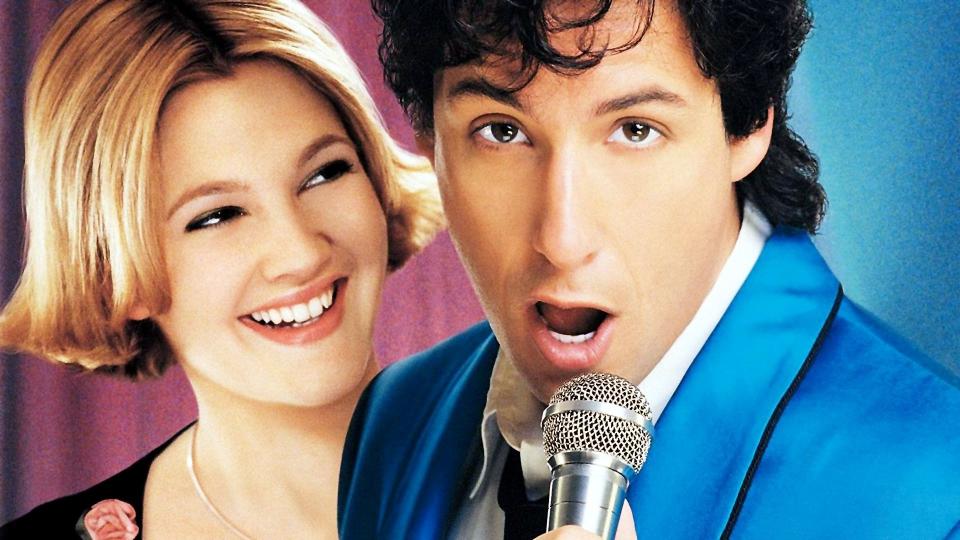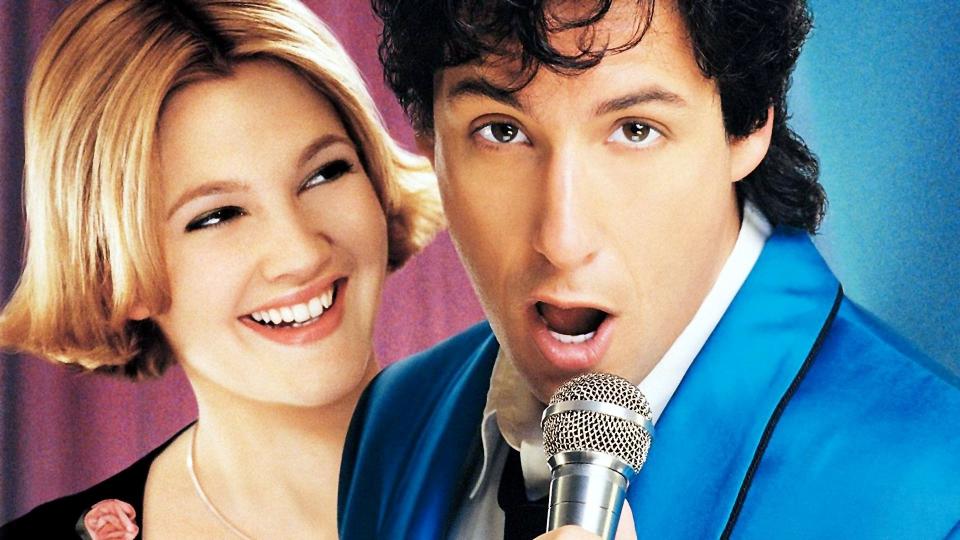How Adam Sandler’s The Wedding Singer Became the Ultimate Love Letter to the ‘80s
“I call it the ‘Every Other Decade Theory,’” Marissa Ribisi’s Dazed and Confused character, Cynthia, tells Pink, Jodi, and Kaye at the film’s beer bust. “The ‘50s were boring. The ‘60s rocked. The ‘70s, my god, they obviously suck. So, maybe the ‘80s will be like, radical.” The line always gets a chuckle. Part of the humor in her hopefulness stems from the fact that Cynthia’s explaining her theory in ’76; as an audience watching Richard Linklater’s out-all-night teen period piece in theaters back in 1993 or a couple years later on VHS, we already knew that anyone relying on the ‘80s to bail them out was utterly doomed and shit out of luck.
That was our generation’s outlook by the mid-‘90s, a decade whose pop-culture attitudes, in hindsight, seem disproportionately formed as a reaction to the obviously lame decade that preceded it. Pseudo-sociologists painted us in magazines as disaffected slackers rebelling against the empty Reaganism of the ‘80s. I’m not sure about all that, but we were a skeptical and sarcastic bunch – the Beavis and Butt-Head generation who could sit on a couch and call things stupid even if we didn’t quite know why we thought that. Look no further than the bands topping the charts to see the shift in mindset: leather and spandex had been banished in favor of flannel and ragged tees; hair hung down grimy and unkempt rather than peroxided and coiffed to the hair metal heavens; and a distortion pedal spooked away all the synths and keyboards lurking behind every hard riff that actually had a pair.
The ‘80s had become little more than a punchline: “That’s so ‘80s.”
Ironically, if Adam Sandler and company set out to make The Wedding Singer now, it might make more sense than it did back in 1998. Audiences have come around to the derided decade over the years. Bingeing shows like Stranger Things and Red Oaks has relit a curiosity about the ‘80s, sparking a nostalgia, even among those who weren’t born yet, for the music, the old-fashioned blockbuster, the innocuous family sitcoms, and an era of fashion and technology that seems more quaint now than laughable. What’s unique about Sandler’s film about a wedding singer out to find his own love connection is that it opted to fondly remember the ‘80s at a time when the decade still felt like an embarrassing moment not far enough in our collective rearview. In many ways, The Wedding Singer became the ultimate love letter to a decade as rejected and hopeless as the mutants over at table nine.
Besides the opening caption that sets the film in 1985, director Frank Coraci, writer Tim Herlihy, and Sandler leave little doubt of when wedding singer Robbie Hart’s story takes place. The three playfully cram in as many ‘80s pop-culture signposts as possible, as if afraid their period piece won’t be convincing enough. Yes, Sandler’s hairdo could not exist in any other era in human history; yes, his annoying nephew wears a Freddy Krueger mask; and, yes, the film’s Grade-A asshole, Glenn Guglia, aspires to be Don Johnson in Miami Vice and drives a Back to the Future DeLorean because, didn’t we all back then? It’s also a film that treats the entire first half of the ‘80s as a single moment, making for anachronistic gags about Rubik’s Cubes, Flock of Seagulls, and “Who shot J.R.?”, all of which would’ve long since faded from the pulse of pop culture by 1985. But, in fairness, the movie’s intended to be a nostalgic smorgasbord, not an accurate account, and much of the film’s appeal comes from picking out a favorite reference: an old man doing the Moonwalk in a bar or maybe the orchestra at Robbie’s doomed wedding to Linda plucking and sawing away on Journey’s “Don’t Stop Believin’”.
Much of the audience plopping down cash to see The Wedding Singer in 1998 had to expect a film that largely uses the ‘80s as cheap fodder for laughs. And, sure, there’s a bit of that. When Robbie’s friend Sammy isn’t sporting acid-washed parachute jeans, he’s out on the town as Michael Jackson, complete with a “Thriller” red vinyl jacket and single silver glove. It’s an inexpensive gag about a secretly lonely guy who has yet to meet a trend he won’t immediately hop on to meet women. But there’s nothing mean-spirited or overly judgmental happening. Early in the film, there’s a scene where Alexis Arquette’s androgynous Boy George-inspired character, George, spells Robbie on vocals at a wedding and works through Culture Club’s “Do You Really Want to Hurt Me” not once but twice. Though a bit of a cringe-worthy moment by today’s standards, it’s really not a cheap shot at George or Boy George or transgenderism, but rather a gag about how you’d expect a handful of dumb, drunken bros to respond to back-to-back helpings of Culture Club; the film playfully doubles down on that awkwardness when George later revisits the number at a Bar Mitzvah full of young children and their Bubbies. It’s all good-natured, making ‘80s jokes without ever really making a joke of the ‘80s.
However, nowhere does Sandler and company show more reverence for the ‘80s than through The Wedding Singer’s use of music. We can all point to the advanced eclecticism of our iTunes collections in 2018, but how many of us weaned on Nirvana and having grown up thinking of Prince not as an icon (or even a symbol) but as a tiny pixie in heels and a blouse were ready to admit that Dead or Alive’s “You Spin Me Round (Like a Record)” was a total jam back in 1998? But The Wedding Singer did more than just pack a film with killer ‘80s tunes. We see Robbie draw from the hits of the era to reveal his emotional state throughout the film: the soaring Dead or Alive going into his wedding, “Don’t Stop Believin’” as it becomes clear Linda is a no-show, an empty-shell version of Madonna’s “Holiday” as he drowns in post-dumped depression, and, most memorably, The J. Geil’s Band’s “Love Stinks” as he, fat guy, sideburns lady, and the mutants at table nine lash out and acrimoniously toast newly weds Cindy and Scott (Whoopedy-doo!). Again, the songs themselves aren’t the jokes; Sandler’s performance of them, including threats of microphone wire strangulation, are where the laughs come from.
For all of Robbie’s trials as he tries to figure out what he wants and how to stop Julia (Drew Barrymore) from throwing her life away on Glenn, maybe it’s fitting that the path to her heart seems to be to fully embrace that ‘80s ethos, all the things that should’ve made my generation’s pessimistic eyes roll upward: flying to Vegas on a whim without even knowing the location of Glenn and Julia’s wedding, serendipitously traveling alongside and teaming up with Mr. “White Wedding” himself, Billy Idol, or finally sending Glenn to the Mile-High Club to play with himself while winning Julia over with a sappy song about remote controls and arthritis. It’s all too much, of course, a criticism commonly attributed to a decade that rarely seemed to know when to say when. But 20 years later, living in a world that lowers the bar on a daily basis, it feels comforting to turn back to a film that focuses on a more innocent time in pop culture where things just might work out and a nice guy and girl can finish first. In other words, it’s actually been nice – maybe more so than some will admit – to have grown old with The Wedding Singer.
Now, for the love of god, will somebody please get some pants on that kid!


